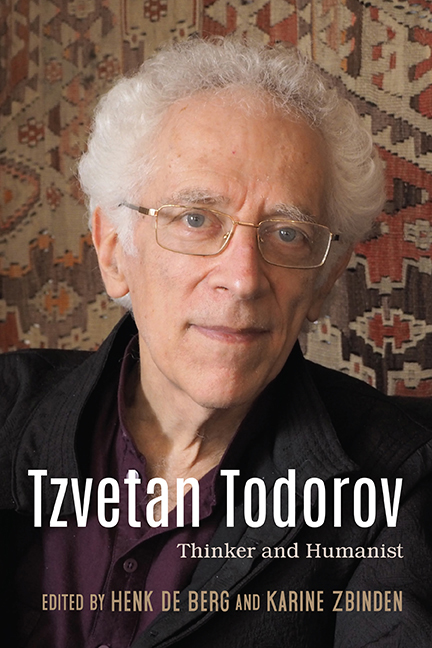Book contents
- Frontmatter
- Contents
- Acknowledgments
- Introduction
- 1 A Marginal Centrist: Tzvetan Todorov and the French Intellectual Field
- 2 Todorov and Camus
- 3 The Enlightenment Redux: Autonomy in Todorov, Glucksmann, and Onfray
- 4 Todorov's Reading of Rousseau: A Heritage for Our Times?
- 5 Tzvetan Todorov's Enlightenment
- 6 Todorov and Bakhtin
- 7 Tzvetan Todorov and the Writing of History
- 8 Tzvetan Todorov and the Trials of History: A Dissenting Voice
- 9 European Integration and the Cultural Cold War: Todorov and Denis de Rougemont
- 10 Tzvetan Todorov on Totalitarianism, Scientism, and Utopia
- 11 Tzvetan Todorov's Political Philosophy
- 12 Interview with Tzvetan Todorov
- Notes on the Contributors
- Index
10 - Tzvetan Todorov on Totalitarianism, Scientism, and Utopia
Published online by Cambridge University Press: 26 April 2020
- Frontmatter
- Contents
- Acknowledgments
- Introduction
- 1 A Marginal Centrist: Tzvetan Todorov and the French Intellectual Field
- 2 Todorov and Camus
- 3 The Enlightenment Redux: Autonomy in Todorov, Glucksmann, and Onfray
- 4 Todorov's Reading of Rousseau: A Heritage for Our Times?
- 5 Tzvetan Todorov's Enlightenment
- 6 Todorov and Bakhtin
- 7 Tzvetan Todorov and the Writing of History
- 8 Tzvetan Todorov and the Trials of History: A Dissenting Voice
- 9 European Integration and the Cultural Cold War: Todorov and Denis de Rougemont
- 10 Tzvetan Todorov on Totalitarianism, Scientism, and Utopia
- 11 Tzvetan Todorov's Political Philosophy
- 12 Interview with Tzvetan Todorov
- Notes on the Contributors
- Index
Summary
TOTALITARIANISM IS ONE OF the defining features of the twentieth century, and its analysis occupies a central place in Tzvetan Todorov’s oeuvre. Having lived the first twenty-four years of his life in communist Bulgaria, he is intimately familiar with its corrupting, devastating, and often lethal effects. His strong claims about totalitarianism have equally strong implications: if Todorov is right, then some of the most important lessons to be learned from history ought to be drawn from the extreme and utopian dictatorships typified by Stalin's USSR and Hitler's Germany. These lessons, all too often ignored in his view, involve a range of interrelated issues, such as the role of the state, political millenarianism, and scientism. In this chapter, I shall focus on the similarities and dissimilarities between Todorov's analysis of the utopian aspects of totalitarianism and that of some other anti-totalitarian thinkers. I shall draw above all on some of Todorov's later works, notably Facing the Extreme (1995), The Imperfect Garden (2002), Hope and Memory (2003), In Defence of the Enlightenment (2009), The Totalitarian Experience (2011), and The Inner Enemies of Democracy (2014).
My main argument in what follows will be twofold. First, I shall argue that Todorov's work on totalitarianism has much in common with the work of classical anti-totalitarian theorists such as Hannah Arendt, Isaiah Berlin, and Karl Popper and that—largely in keeping with them—he correctly identifies some of the key features of the phenomenon of totalitarianism.Second, I shall put forward the thesis that there exists a major difference between Todorov and Karl Popper as regards the question of totalitarianism's relation to scientism. In particular, Popper's conception of scientific method and perspective as checks against totalitarianism represents a different take on the place of science in the sociopolitical order.
Democratic Meliorism
For Todorov, totalitarianism is characterized first and foremost by its radical-utopian dimension: it holds out “the promise of … paradise on earth and salvation for all.”3 To avoid misunderstanding, he stresses that renouncing utopianism in politics need not imply passivity in the face of injustice. He asks: “if it turns its back on utopianism, does democracy have to also abandon all hope of a better world? Not at all, he says. Democracy is not necessarily conservative; it does not have to resign itself to accepting the world as is.
- Type
- Chapter
- Information
- Tzvetan TodorovThinker and Humanist, pp. 172 - 187Publisher: Boydell & BrewerPrint publication year: 2020

